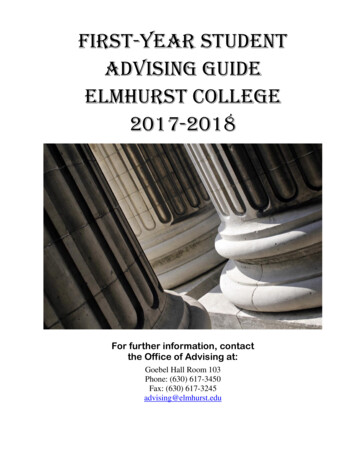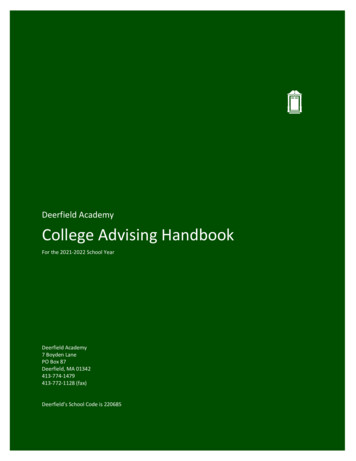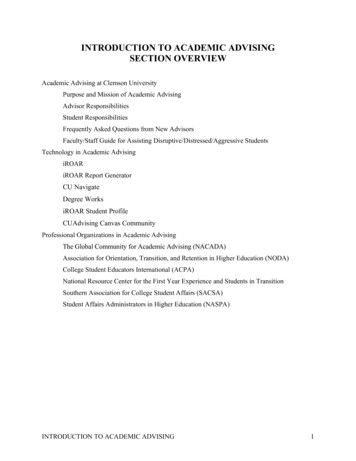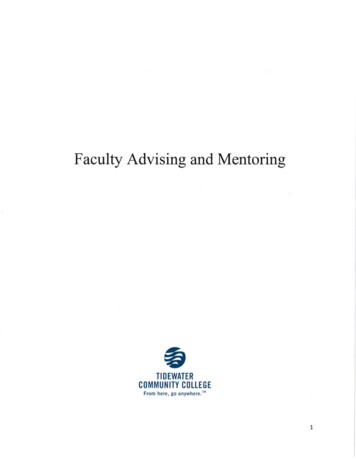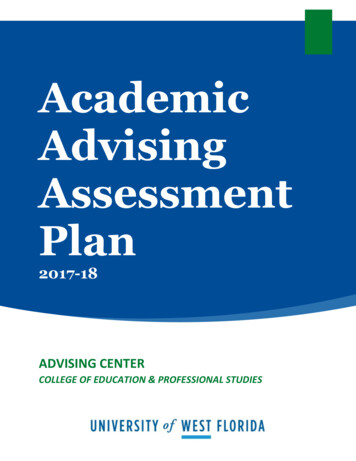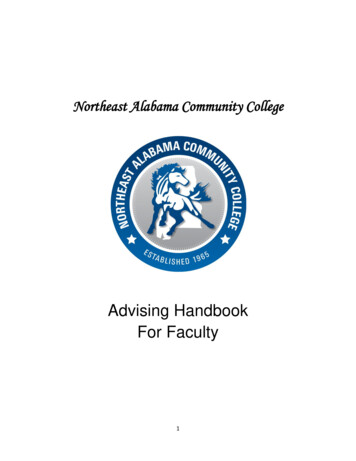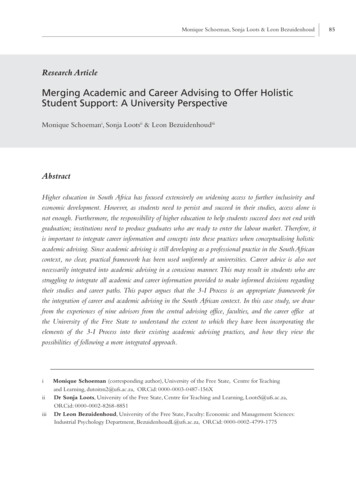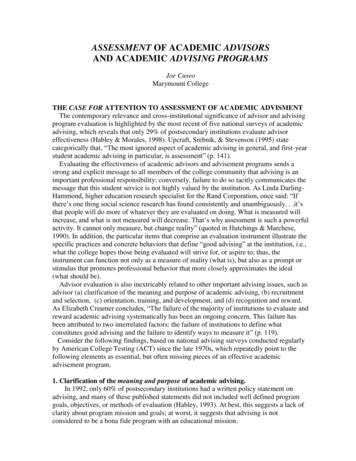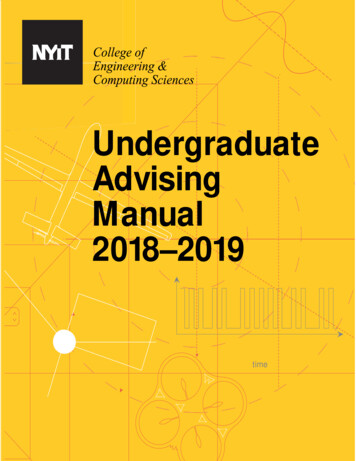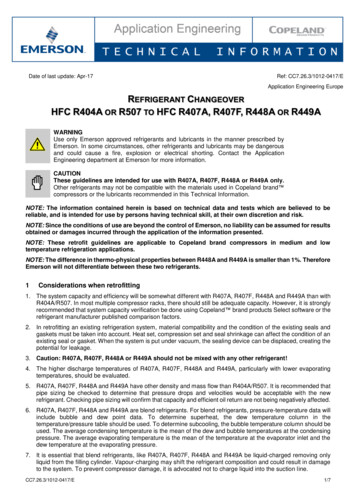
Transcription
A NEW METHOD OF ADVISING:E-ADVISINGHENRY FORD COMMUNITY COLLEGEDEARBORN, MICHIGAN
TABLE OF CONTENTSProcess Improvement Team . 2About Henry Ford Community College. 3Background Information . 4Project Statement . 5Operational Definitions . 6Description of the Current Process . 8Academic Advising . 8Degree Audit, Program Evaluation, and Curriculum Tracks . 10Course Selection and Registration . 11Analysis of the Current Situation . 13Obstacles to Academic Advising . 13HFCC Student Outcomes . 15E-Advising Software Systems . 16Improvement Theory and Implementation Plan. 17Cause and Effect Diagram. 17Force Field Analysis . 18Improvement Theory . 19Proposed Improvements . 20Improvement Cost Benefit Analysis. 21Anticipated Positive Results. 22Gantt Chart . 23Analysis of Results . 24Recommendations for Future Teams . 25Steering Committee Feedback . 26Acknowledgments . 27Appendix . 28Appendix A: CPI E-Advising Team HFCC Student Survey . 28Appendix B: CPI E-Advising Team HFCC Staff Survey . 29Appendix C: Open-Ended Responses from HFCC Staff Survey . 31Appendix D: Ellucian Quote for Colleague Student Planning . 351 Page
PROCESS IMPROVEMENT TEAMTeam Sponsor:Dr. Lisa Copprue, Vice President of Student Affairslcopprue@hfcc.eduTeam Leader:Cassandra Fluker, Student Activities Officercrfluker@hfcc.eduTeam Scribe:Bryan Johnson, Systems Administrator-IT Servicesbrjohnson1@hfcc.eduTeam Member:Elisha Ables, Records Associate IIIesables@hfcc.eduTeam Member:Diane Eberts, Assisted Learning Services Coordinatordeberts@hfcc.eduTeam Member:Debra Szymanski, Academic Coordinator and Faculty, Health Sciences Divisiondszyman@hfcc.edu2 Page
ABOUT HENRY FORD COMMUNITY COLLEGEHenry Ford Community College in Dearborn, Mich., is a comprehensive public community collegeserving nearly 16,000 students each fall and winter semester in southeast Michigan. HFCC isdedicated to preparing students for a rapidly changing world and workplace by offering more than100 associate degree career and university transfer programs.HFCC offers high-quality, innovative programs to meet the educational and training needs of theregion. Students prepare to transfer to a university or prepare to go directly to work. HFCC alsospecializes in customized workforce development training for business and industry. Since itsfounding in 1938, HFCC has been the gateway to higher education for thousands of students whoseek affordable, high-quality post-secondary education. To learn more about Henry FordCommunity College, please visit us at www.hfcc.edu or on Facebook, www.hfcc.edu/facebook,Twitter, www.hfcc.edu/twitter, and on YouTube, http://www.youtube.com/user/henryfordcc, orcall 1.800.585.HFCC (4322).3 Page
BACKGROUND INFORMATIONThis publication is a Continuous Process Improvement (CPI) report on the topic of e-advising. CPI isa philosophy of improvement combined with a set of tools designed to make college processesmore effective and efficient. The overall goal is to promote better service to students and tofacilitate collaboration among faculty and staff working on college projects.The generic term e-advising, although also the brand name of a specific software package, refers toan online system for advising students regarding course selection, degree requirements, and thedevelopment of a plan for completing academic goals. These systems are designed to supplementand enhance face-to-face academic advising. These systems are designed to keep the studentengaged and on-track in between advising visits by providing clear goals, the steps required incompleting those goals, and visual indications of progress made.Currently, Henry Ford Community College has not implemented any form of e-advising system. TheCPI E-Advising Team was tasked with determining the current state of the college’s electronicacademic advising processes, and providing recommendations that we feel will improve thoseprocesses. Since 2002, Henry Ford Community College has used a Student Information Systemcalled Colleague, which is locally known as HANK. It is a prerequisite that any e-advising systemthat the college may consider have a high level of integration with HANK.4 Page
PROJECT STATEMENTTo create an electronic advising process using the current Colleague software as measured by theimplementation of the system, improved program requirement accuracy, and ultimately,increased student satisfaction and retention.5 Page
OPERATIONAL DEFINITIONSFollowing are the definitions of terms used throughout this report: Advising Process: The process of providing potential, new and current students a set ofguidelines and/or information required to successfully accomplish academic and personalgoals specific to the unique needs of each student.Academic Advisor: An HFCC employee who: has earned a bachelor’s degree and providesacademic schedule planning and advising to potential and new students for all classes andprograms offered at HFCC. Additional duties include: interpreting placement test results,assess and refer students to appropriate campus departments and student services specificto the needs of each student.Colleague: Ellucian's name for one of their Student Information System (SIS) softwarepackages. Colleague provides tools for managing HFCC's Student, Financial, and HumanResources systems. Used synonymously with HANK at HFCC.Colleague Student Planning: An STSS module that allows students to engage in degreeplanning, registration, and communication with academic advisors.Colleague Student Finance: An STSS module that allows students to manage their financialaccounts with HFCC.Counselor: An HFCC faculty member who: has earned a master’s degree in Counselingand Guidance, maintains a Michigan LPC license and stays current of legal and ethicalissues in counseling and higher education. A counselor’s duties include but are notlimited to Personal Counseling as well as all aspects of Career Counseling incorporating:current knowledge of curriculum guides and college transfer agreements, career testingand assessment, support services for students at risk and developing plans for studentson dismissal, academic probation, or are Financial Aid violators. Counselors must alsoremain current regarding psychological and emotional conditions to includerecognizing symptoms, explaining diagnosis, developing treatment plans, and usingappropriate referrals.Datatel: The software vendor that originally developed Colleague. Datatel was combinedwith SunGard in 2012 to form Ellucian. Some HFCC employees will still refer to HANK asDatatel.Degree Audit: A module within Colleague to build and maintain Program Requirementsthat can be used to generate Program Evaluations showing a student’s progress within aProgram of Study.Degree/Student Planning: The activity of reviewing the requirements for a student'sprogram of study, and planning the proper sequence and terms in which the requiredcourses will be completed.e-advising (Electronic Advising): Generic term for a software system that provides anonline process for academic guidance.Ellucian: An educational software vendor based in Fairfax, Virginia. The company wasformed through the 2012 combination of educational software rivals Datatel, Inc. andSunGard Higher Education.HANK: HFCC's local branding of the Ellucian Colleague system. It stands for Henry Ford'sAutomated Network of Knowledge.6 Page
HANK UI: A web deployed user interface that allows faculty, staff, and administrators tomanage multiple aspects of the HANK system.Program Evaluation: An evaluation that tracks a student's progress in his or her programof study. A key tool in both academic advising and self-directed degree planning, a degreeaudit can currently be generated from both HANK UI and WebAdvisor.Program of Study: (PROGRAM OF STUDIES) A set of courses or other work that must besuccessfully completed before qualifying for a degree, diploma, or certificate from theCollege. (Adapted from: rs/glossary.html)Program Requirements: The preliminary qualifications necessary to enroll in aspecific program, in addition to specialized guidelines and courses required to completea selected area of study.Student Information System (SIS): A software application, or suite of integratedapplications, that allows educational institutions to manage student data. An SIS isequivalent to an Enterprise Resource Planning (ERP) system in a corporate environment,and can be capable of managing other aspects of an institution's business operations.Student Self-Service (STSS): A web application that will eventually replace WebAdvisor. Itis currently capable of running the Colleague Student Planning and Colleague StudentFinance modules. HFCC has already implemented the Colleague Student Finance module.WebAdvisor: A web application that allows students, faculty, and staff to access theHANK system for class information, grades, and HR details.WebAdvisor E-Advising: A WebAdvisor module that allows students to engage in degreeplanning, and communication with academic advisors.7 Page
DESCRIPTION OF THE CURRENT PROCESSACADEMIC ADVISINGNew students are required to start their enrollment process with an advisor at the Welcome Center.An advisor will meet with the student on a walk-in basis and assist them in interpreting theirplacement test results, select a course load for the next semester, and answer general questionspertaining to admission and financial aid. Appointments are not required for students to seeadvisors. All sessions are on a walk-in basis, unless a student requests to see a specific advisor.According to the CPI E-Advising Team Student Survey, students without an appointment generallywait thirty minutes or less; however, some wait longer during peak times of the semester. Advisorsprimarily communicate with students verbally, however, they sometimes email students withrequested information, such as a transfer guide or program plan.Returning Perkins/Career Technical Educations students are welcome to see advisors when makingcourse selections, but the following student populations must see counselors only: All other continuing HFCC students seeking course selection assistanceAcademically at-risk (probation or dismissal)Undecided majors, including liberal arts, general studies, and general scienceDual enrolled and early college studentsCounselors are licensed professionals who provide personal counseling and perform careercounseling services where a complete career profile is produced, analyzed, and interpreted to helpstudents make a decision regarding their program of study.There are currently 18 adjunct advisors, five adjunct counselors, and eight full-time counselors. Ofthe eight full-time counselors, four are reassigned with special and specific duties outside of thegeneral realm of meeting with students for class selection.When meeting with students both counselors and advisors follow the program evaluations inadvising students on class selections. In the HFCC Staff Survey, 28% of 132 respondents (full/parttime faculty, administrators, and support staff) rely on program evaluations (Figure 1).8 Page
HFCC Staff SurveyProgram and Course AdvisingResources Used when Advising Students:ResourceYesPrinted CatalogWebsiteHANK (Datatel)Program EvaluationArticulation %72.0%76.5%FIGURE 1: DEGREE PLANNING RESOURCES USED WHEN ADVISING STUDENTSHFCC Student SurveyProgram and Course AdvisingInstructorProgram Evaluation (WebAdvisor)Counselor/AdvisorProgram Director/Assoc. DeanPrinted CatalogWebsiteRegistrar's OfficeFamily/FriendOtherFIGURE 2: COUNSELORS AND ADVISORS ARE THE MOST OFTEN USED DEGREE PLANNING RESOURCE FOR STUDENTS9 Page
DEGREE AUDIT, PROGRAM EVALUATION, AND CURRICULUM TRACKSDegree Audit is a HANK module that allows registration staff to maintain the set of courses thatmust be completed in order to satisfy the requirements of a certificate or degree program. HANKcan then compare a given student’s academic data against the Degree Audit data for a givenprogram of study to generate a program evaluation.Students, counselors, advisors, and the Registrar staff all rely on the program evaluation todetermine which courses a student must take in order to complete their degree requirements(Figure 3). Students are able to access their program evaluation in WebAdvisor at any time.Counselors and advisors use the program evaluation each time they meet with a student to discussthe coursework a student needs. The Registrar staff use the program evaluation to determine ifstudents meet the degree requirements to graduate. It is essential that this tool is accurate andupdated any time the degree requirements for a program or certificate change.Degree Audit data must be programmed into HANK following a specific format. This format allowsfor a great degree of flexibility in how program requirements are constructed, but it is also difficultto learn. There is currently only one Registration employee capable of making modifications to theDegree Audit system. Current policy states that program requirement changes must be approved bythe College Council before Registration employees make any changes to Degree Audit within HANK.HFCC Employee SurveyProgram and Course AdvisingUsefulness of Resources When Evaluating Student Progress:ResourcePrinted CatalogWebsiteHANK (Datatel)Program EvaluationUseful34.4 GURE 3: 59% OF EMPLOYEES THAT ADVISE STUDENTS VIEW PROGRAM EVALUATION AS MOST USEFULThe Curriculum Track functionality within HANK, which has not been implemented, allows staff tobuild recommended course sequences which are tied to a specific Program and Catalog Year. HANKcan use this data with some systems, like Colleague Student Planning, to generate sample degreeplan templates for use by students.New college policy mandates that course sequence data is created for every program of study. Thisdata will be displayed on the HFCC Courses Website, and could be used to enter Curriculum Tracksinto HANK should the college decide to implement a system that took advantage of that data.10 P a g e
COURSE SELECTION AND REGISTRATIONWhen students receive academic advising to assist with course selection, they still must registerthemselves for sections via WebAdvisor. Due in part to policies designed to promote self-serviceand self-reliance among students, there has been a rapid decline in standing registrations, thoseprocessed by a HFCC employee via HANK UI, since 2010. As Figure 4 indicates, WebAdvisor nowprocesses over 90% of student registrations.Registration Methods by YearFIGURE 4: REGISTRATION METHODS SINCE HANK IMPLEMENTATIONThe functionality of registration within WebAdvisor has remained virtually unchanged since thelast major update, version 3.1, in 2007. Students execute WebAdvisor workflows that allow them tofind and register for available Course Sections. The flowchart describes the current studentregistration process (Figure 5).Ellucian is building a new student hub to serve as replacement to WebAdvisor called Student SelfService. This extensible system allows new modules to be plugged in as they are released. Ellucianhas currently released the Colleague Student Finance and Colleague Student Planning modules.HFCC was a beta member and early adopter of the Colleague Student Finance module.11 P a g e
Current Student Registration ProcessStudent Needs to Register for Course SectionsYesDoes the Student KnowWhich Courses to Take?Does the Student WantPersonal AcademicAdvising?Does the Student KnowHow to Register?NoYesLog IntoWebAdvisorNoYesGo to theWelcome Centerfor Advising andAssistanceNoDoes the Student RequireAssistance Other thanCourse Selection?YesNoStudent Uses HFCCWebsite, ProgramEvaluation, or Catalogto Choose CoursesYesChooseWebAdvisorSchedule PlannerLinkEnter Term,Courses, Breaksto GeneratePotentialSchedulesPrint the Details ofthe ChosenProposedScheduleAdd ChosenSections toPreferredSections List viaExpressRegistrationWorkflowUsing Schedule PlannerSystem?NoChooseWebAdvisorSearch forSections LinkManually Searchto DetermineAvailable Sectionsthat Fit IntoStudent’sScheduleAdd ChosenSections toPreferredSections List viaSearch andRegister forSectionsWorkflowStudent Completes Registration for Items on the PreferredSections List via Register and Drop Sections WorkflowFIGURE 5: FLOWCHART OF CURRENT STUDENT REGISTRATION PROCESS12 P a g e
ANALYSIS OF THE CURRENT SITUATIONOBSTACLES TO ACADEMIC ADVISINGHFCC faculty and staff were asked to complete a survey regarding the resources they use and anyobstacles they face while providing academic advising. The most common resources used are: Printed catalogHFCC websiteProgram Evaluation via HANK UIProgram Evaluation via WebAdvisorArticulation Agreements/Curriculum GuidesOpinions varied on the usefulness of these resources (See complete survey results in the Appendix).However, there was broad agreement among survey respondents that inconsistency exists betweenthe data located in these various resources.Please Note: Comments to open ended questions are exactly as written, grammar/spelling, byrespondent.A sample of survey respondents’ answers to open ended questions regarding obstaclesencountered while providing academic advising: Website program information and online catalog information are frequently inaccurate.This has gotten noticeably worse in the last year. There is no one who seems to know howchanges occur nor who can make corrections.We need to update our online program catalog to reflect the most recent changes.There should only be ONE source of information as it pertains to curriculum information.That source should either be HANK or feed into HANK. At the moment there are too manysources of information and no one is for certain which information is correct.The HFCC Website can (& possibly should) be the most useful resource readily accessible tofaculty, staff, counselors/advisors, and students alike. It is the single most identifiableresource to student prospects as well. While the HFCC Website is more has improved itsfunctionality, become more user-friendly and visually impressive, it continues to housedated materials particularly in the degree programs/catalog. Degree programs/catalogdescription information, requirements, including prerequisites should be consistent acrossall resources at HFCC campus. Users should be able to refer to the website catalog,webadvisor and/or other resources and acquire the consistent data. At present data andprogram/catalog information is not consistent across all formats.Some of the program evaluations in Hank are incomplete (ie. Fitness Leadership). Theprogram requirements on the Website are then used. Feel that these two should be in sync!The issue of inconsistent program requirement data across resources causes problems for currentstudents and advisors. It is imperative that approved program requirement changes bedisseminated between resources in a timely and accurate fashion. Any proposed e-advising systemimplementation will fail without accurate program requirement data.13 P a g e
Since this issue has significant overlap with the focus of the concurrently running Catalog CPI Team,we will refrain from making any specific recommendations regarding this process as we wait forthat team to report their findings. The Catalog CPI Team is aware that any process designed toensure the College Catalog is accurate must also take into account how that data is entered intovarious other resources, specifically HANK.14 P a g e
HFCC STUDENT OUTCOMESHFCC currently has a very low number of students who successfully complete the requirements tograduate. While not all students intend on graduating from Henry Ford Community College, ouroverall graduation rate numbers fall well below the comparison median (Figure 6). While it isimpossible to assign poor graduation and retention numbers to one specific cause, our teambelieves that poor degree planning may contribute to these numbers. Overall student performancedrops in the absence of clearly defined goals and methods for achieving those goals.FIGURE 6: GRADUATION AND RETENTION DATA FOR THE 2009 FTIAC COHORT15 P a g e
Associate Degrees Awarded by Academic Term8007006005004003002001000Fall 2012Winter2013Summer Fall 20112013Winter2012Summer Fall 2010 Winter20122011Summer2011FIGURE 7: TOTAL ASSOCIATE DEGREES AWARDED BY HFCC FOR A GIVEN TERME-ADVISING SOFTWARE SYSTEMSAn early determination was made that any e-advising system we chose to recommend must have ahigh level of integration with Colleague/HANK. The costs and hurdles of attempting to implement asystem that would not directly interface with HANK were too high. This led us to concentrate onproducts supplied by our current SIS vendor, Ellucian.Ellucian currently has two systems that provide e-advising functionality: WebAdvisor E-Advisingand Colleague Student Planning.The WebAdvisor E-Advising module provides workflows for Student-to-Advisor communication,approval, and registration. HFCC has already purchased a license for WebAdvisor E-Advising aspart of a large bundle of software purchased from Ellucian. However, WebAdvisor E-Advising wasnever implemented at HFCC due to insufficient staff resources in key areas. Although, Ellucian willstill support WebAdvisor E-Advising for legacy clients, no new development is occurring within thisnearly seven year old system.Ellucian is now investing their research and development on a new module called ColleagueStudent Planning which runs within Colleague Student Self-Service. Colleague Student Planningreplaces functionality found within WebAdvisor E-Advising. Combining a modern user interfacewith an updated technology stack, Ellucian is able to deliver new features and functionality withgreater speed than was previously possible.16 P a g e
IMPROVEMENT THEORY AND IMPLEMENTATION PL ANCAUSE AND EFFECT DIAGRAMThe following cause and effect diagram demonstrates the various factors that lead us to believe aneffective electronic advising system would prove beneficial.FIGURE 8: CAUSE AND EFFECT DIAGRAM17 P a g e
FORCE FIELD ANALYSISDESIRED CHANGE: Improved program requirement accuracy increasing student retention andgraduation rates.DRIVING FORCESRESTRAINING FORCES- Students complete courses in the mostexpeditious route- Resistance to change by faculty & staff- Positive increase in retention and successrates for students as they work to completecertificates and degrees- Budget constraints: initial and continuingcosts, sufficient staffing and training costs- Possibly reduce frustration level forstudent- Student access to technology-Possibly reduce taking unnecessarycourses- Accuracy of the Degree Audit Program-Provide for the correct placement ofstudents in courses based on prerequisiterequirements-Undocumented changesACTIONS: Purchase of Colleague Student Planning module/software Hire sufficient staff to implement Student Planning Develop training modules for counselors, advisors and associated staff Implement Student Planning module with select focus groups Analyze results and improve process, as necessary Implement Student Planning module across all student populations18 P a g e
IMPROVEMENT THEORYThe Colleague Student Planning module/software was developed to effectively work withinHFCC’s current HANK systems and contains flexible programming options which will:1. Provide a convenient user friendly interactive online counseling and advising servicespermitting current students the opportunity to review required and recommended classesfor their chosen academic/degree paths.2. Design online degree planning paths with set degree and registration parameters as definedand locked by the counselors and advisors specific to each student’s needs.3. Provide students a convenient online, one site method to schedule and register for classes,while maintaining: the appropriate program guidelines, the opportunity to reviewscheduling conflicts and obtain the necessary advisor/counselor approvals.4. Provide a basic, native device registration experience for mobile (Android & iOS) devices viathe Ellucian Go. HFCC has already implemented Ellucian Go, however mobile registrationfunctionality via Ellucian Go is only available to Colleague Student Planning clients.5. Set up a HANK Registration “PERC” hold to prevent students from registering beyond 75attempted credit hours without meeting with an academic advisor to avoid graduationdelays.The E-Advising Team believes it is essential to ensure the success of the recommendedsoftware by:1. Improving the accuracy of the Student Planning module by ensuring that the Degree AuditProgram Guidelines are up-to-date and correct.2. Training counselors and advisors to configure the student planning system to create themost beneficial path for collaborative online student advising.3. Hiring three full-time academic advisors to ensure a consistency in student services andfacilitate ongoing relationships among counselors, advisors, and students for futuresemesters.19 P a g e
PROPOSED IMPROVEMENTS1. Purchase Colleague Student Planning Software.2. Work with the Registrar and Courses Website Team to develop a definitive process toensure that approved changes to course and program master documents are entered intoHANK in an accurate and timely fashion. This process should include a method of verifyingif and when course and program master changes were entered into HANK.3. Review and update existing Degree Audit data within HANK for accuracy and completeness.4. Hire two Records Associate III staff for the Registrar’s Office whose duties include updatingand maintaining Degree Audit and Curriculum Track data within HANK.5. Implement the Curriculum Track functionality within HANK, using Program Sequence datastored on the Courses Website, in order to utilize the “Sample Degree Plan” functionality ofthe Student Planning Modul
Henry Ford Community College in Dearborn, Mich., is a comprehensive public community college serving nearly 16,000 students each fall and winter semester in southeast Michigan. HFCC is dedicated to preparing students for a rapidly changing world and workplace by offering more than
